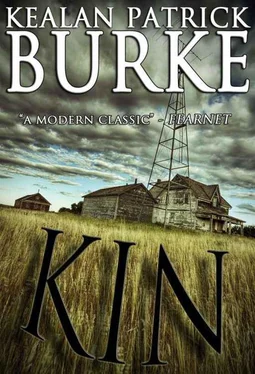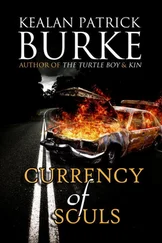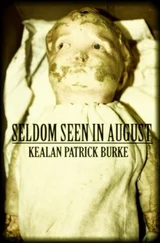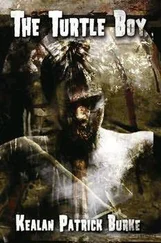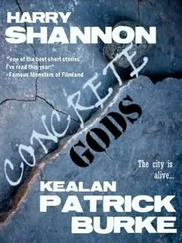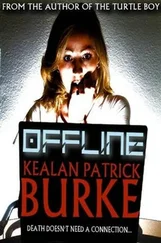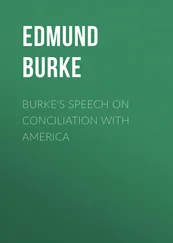“Take it easy. She’s hurt bad.”
Maybe , she thought, this was my road. Maybe it was all I was supposed to do. Ain’t that a kick in the head?
She didn’t know, and was too tired to think about it any longer.
“Can you stand, Ma’am?”
Tired of trying to keep myself together.
All that was left were the colors.
The gray.
Tired of trying to hold myself in.
The white.
“She’s passing out.”
The red.
Then nothing.
Elkwood, Alabama
October 2nd, 2004
“Sheriff McKindrey?”
McKindrey jumped, and put a hand to his chest, though the only thing he was likely to suffer today was heartburn after the burritos and refried beans he’d put away not an hour before. Still, the jolt had been enough to remind him that three beers combined with the soft chuckling of the water in the creek had made him drowsy, and persuaded him there was no need to be on his guard. Hell, even if a catfish nibbled on the bait currently floating around out there on the end of his line, he wasn’t going to be fussed, and the slight chill to the breeze hadn’t been enough to penetrate his languor. To him, the act of fishing was simply that: an act. The peace and quiet, the ambience, and of course, the beer, were the real draw. He was seldom bothered by anyone down here, but just as he’d been about to doze off and let the folding chair accept his weight, he’d heard feet crunching upon the dry earth of the bank, and then the voice.
He scratched his head and wondered how it was that a Podunk next-to-dead town like Elkwood always managed to have something somewhere that needed attending to, usually when he was in no mood to do anything other than get drunk.
Annoyed, he sat up in the chair, felt it wobble beneath him and stamped his feet down on the grass to stabilize himself. It wouldn’t do to end up flat on his ass in front of someone who might have urgent business. He craned his neck around and squinted at his visitor.
Quickly, he rose.
“Yes?”
Strangers meant trouble. In all his time in Elkwood, he had yet to see one that wasn’t. Even if they themselves weren’t the source of it, it wasn’t long finding them. And when that happened, McKindrey ended up with stress headaches and high blood pressure, which frequently left him short of breath and sweating like a hog in a heat wave, though Doc Wellman had liked to pin those symptoms on his excess weight. Whatever the culprit, he grew sensitive to sound and his bowels got a mind of their own whenever he found himself forced to weather the scrutiny and interminable questions from severe looking troopers, investigators and officials, all of whom looked at him like he was some dumb yokel who liked to sit around all day chewing chaw and diddling his sister. True, he supposed he wasn’t as well-educated as some of the suits who showed up to throw names like Quantico at him—which McKindrey thought sounded like a college for grease monkeys—but nor was he a fool. He’d had his share of learning, and abided by the belief that most of what he’d kept and valued in the way of education he’d come by out in the world, not sitting in a snug chair listening to some professor waffling on about numbers and theories. But he never said as much to the stern-faced men with their square, clean-shaven jaws, funeral suits, and slick-backed hair. They thought him a buffoon and that suited him just fine. Better that than to have them suspect he knew more than he was telling.
The man standing on the bank appraising him did not look like any official he’d ever seen, and he wanted to believe that was a good thing. But the expression on the guy’s face told him that might be a premature assumption.
“Catch anythin’?” the black man asked. He was tall—very tall; the Sheriff put him at about six-six—and well built. His head was shaved bare, and he wore sunglasses that reflected McKindrey’s perplexed face back at him. He was dressed in blue jeans, a black belt with a silver buckle, and a white shirt, open at the collar. He was smiling, but it didn’t put McKindrey at ease.
“Nothin’ I want,” McKindrey said flatly. “Help you with somethin’?” While he waited for an answer, he mentally reviewed the proximity of his weapon, which he’d taken to removing before he sat down so the weight of it didn’t make the holster chafe his thigh.
“I hope so.”
“How’d you find me?”
“Lady at your office said you’d be down here.” He grinned. “She sure was nice. Pretty too.”
McKindrey made a note to reprimand Stella as soon as he got back, assuming the man wasn’t here to rob or kill him, in which case he wouldn’t be getting back at all, at least not in one piece. That Stella was his wife didn’t make a lick of difference. If anything it meant she should be even more cautious about who she sent after him.
Making his impatience clear, he said: “So, what is it you need?”
“Answers.”
“’Bout what?”
“About a family that lived around here up until a few months back.”
McKindrey remembered where he’d left the gun, and now that he knew what the black man wanted, it suddenly became very important that he retrieve it. He could see it resting on the ground next to his cooler twelve feet or so away, its barrel on the rim of his hat, the handle in the grass.
“Which family would that be?” he asked.
“I think we both know the answer to that,” the man told him. “What you might not know is what’s goin’ to happen to your cracker ass if you try to pick up that gun over there.”
McKindrey did not immediately look away from the gun. Instead he took his time until he had formulated what he felt was an adequate response to the insult he’d just been dealt. Hooking his thumbs into his gun belt, he smiled tightly. “I know you, son?”
“Doubt it. My name’s Beau, though, just so we can officially say we’re acquainted.”
McKindrey reckoned it sounded like a faggot’s name.
“Well, Beau ,” he said. “Why don’t you give me one good reason why I shouldn’t drag your black ass to jail for insultin’ an officer of the peace?”
Without hesitation, the man nodded. “I’ll give you two.”
McKindrey felt himself tense as the man reached behind his back and produced a handgun, which he held up for the Sheriff to see as he cocked it. “This is one,” Beau said, then nodded at something over McKindrey’s shoulder, something the Sheriff realized much too late was the sound of more footsteps, coming at him fast. He cursed.
“That’s two,” the black man said, and McKindrey turned. He had the impression of a pale-face looming in his vision before something struck him hard between the eyes and he went down into the darkness.
* * *
He awoke with a groan and almost immediately two things dawned on him:
First, his nose was broken and throbbing like a teenager’s pecker at the prom. He tasted blood on his lips. The tops of his cheeks were stiff and unyielding when he tried to gauge the extent of the damage by grimacing.
Secondly, he was no longer at the creek. The absence of sound was his first clue. The smell and the gloom confirmed it. Slaughterhouses had a similar odor, like shit and rotting carcasses. Automatically he tried to wrinkle his nose but the flare of pain stopped him and he spat a wad of blood and phlegm that landed with a smacking sound on the stone floor between his feet. He blinked to coerce his vision into cooperating, and a moment later, the room in which he sat with his hands bound behind him and his feet tied to the legs of the chair came into focus.
A kitchen, dirty and abandoned, the windows caked with dust, the floor littered with trash, broken dishes, and mouse droppings.
Читать дальше
